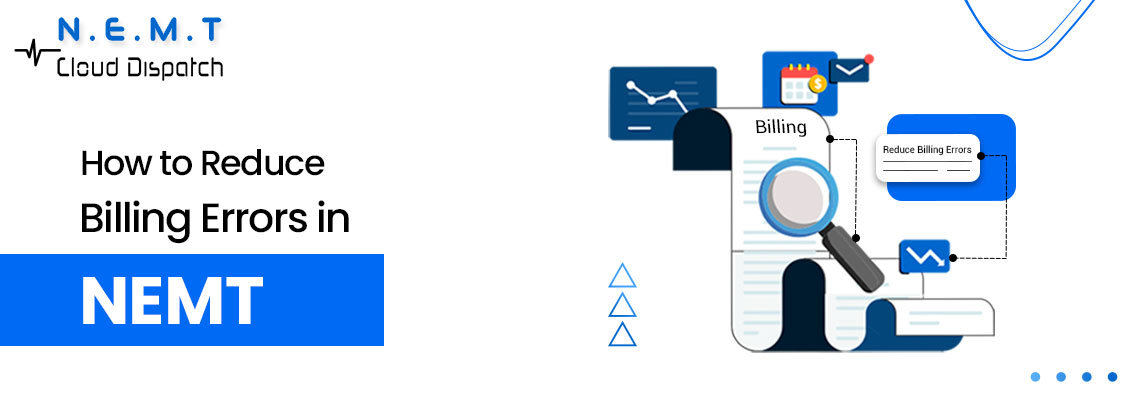Non-Emergency Medical Transportation (NEMT) plays a crucial role in ensuring access to healthcare for many individuals who may face mobility challenges. However, billing errors can occur in NEMT services, leading to financial losses and administrative burdens for both providers and patients. Let’s explore How to Reduce Billing Errors in NEMT and what is importance of accurate billing.
What are causes of Billing Errors in NEMT
Errors may occur due to incomplete or incorrect documentation of trip details, patient information, and billing codes. This can lead to discrepancies between the services provided and what is billed to insurance companies or Medicaid agencies.
Lack of Training:
Insufficient training of staff members involved in billing processes can contribute to errors. Without adequate knowledge of coding protocols, billing guidelines, and compliance requirements specific to NEMT services, staff may inadvertently submit inaccurate claims or overlook essential documentation.
Eligibility Verification Issues:
Failure to verify patients’ eligibility for NEMT benefits or obtain proper authorization from insurance companies or Medicaid agencies can result in billing errors. Providers may unknowingly transport ineligible patients or neglect to secure necessary authorizations, leading to denied claims and financial losses.
Coding Errors:
Improper coding of services rendered during NEMT trips can lead to billing errors. Using incorrect procedure codes or failing to accurately reflect the level of service provided can result in claim denials or underpayments.
Manual Data Entry Mistakes:
Relying on manual data entry for documenting trip details and billing information increases the risk of typographical errors, transposed digits, or other data entry mistakes. Such errors can lead to discrepancies between the information recorded and the services actually rendered.
Importance of correct Billing process in NEMT Billing?
The correct billing process in Non-Emergency Medical Transportation (NEMT) is paramount for several critical reasons. Firstly, it ensures the financial stability of NEMT providers by facilitating timely reimbursement for services rendered, preventing claim denials, and optimizing revenue streams. Secondly, accurate billing practices demonstrate compliance with regulations, mitigating the risk of penalties or legal consequences. Moreover, accurate billing processes contribute to operational efficiency, patient access to care, and the preservation of trust and reputation within the healthcare community.
Additionally, reliable billing data supports data-driven decision-making and strategic planning, enhancing organizational effectiveness. Overall, to reduce billing errors is essential for the financial health, regulatory compliance, operational efficiency, and reputation management of NEMT providers.
How To Reduce NEMT Billing Errors?
Accurate documentation is the cornerstone of error-free billing in NEMT. Providers should ensure that all relevant information, including trip details, patient demographics, appointment schedules, and authorization forms, are documented meticulously. Implementing electronic health record (EHR) systems or specialized NEMT software can streamline documentation processes, reducing the likelihood of errors caused by manual data entry.
Proper training is essential for staff members involved in billing processes. From drivers to administrative staff, everyone should receive training on coding protocols, billing guidelines, and compliance requirements specific to NEMT services. Regular training sessions and updates on industry regulations can help staff stay informed and proficient in their roles, minimizing billing errors stemming from misunderstandings or outdated practices.
Further, before scheduling transportation services, providers must verify patients’ eligibility for NEMT benefits and obtain necessary authorizations from insurance companies or Medicaid agencies. Failure to confirm eligibility or obtain proper authorization can result in denied claims and billing errors. Implementing automated eligibility verification systems can streamline this process, reducing the risk of oversights or inaccuracies.
Lastly, periodic audits of billing records and claims submissions are crucial for identifying and rectifying errors proactively. Providers should establish internal auditing procedures to review trip documentation, coding accuracy, and compliance with billing regulations. Additionally, implementing quality assurance measures, such as peer reviews or independent audits, can help identify systemic issues and areas for improvement within the billing process.
The Role of NEMT Software in Reducing Billing Errors
Transport billing software plays a pivotal role in streamlining operations within non-emergency medical transportation (NEMT) providers, offering a comprehensive solution to manage various aspects of service delivery. NEMT Billing Software platforms facilitate efficient scheduling and dispatching of trips, optimizing route planning to minimize travel time and costs.
Additionally, no fault billing software automates documentation processes, ensuring accurate recording of trip details, patient information, and billing data, thereby reducing the risk of errors and compliance issues. Moreover, these platforms often integrate with electronic health record (EHR) systems and billing software, enabling seamless data exchange and improving coordination between healthcare providers and transportation services. Here you can explore the efficient billing process: How NEMT Billing Software Streamlines the Billing Process?
Conclusion
NEMT software provides real-time tracking and monitoring capabilities, allowing providers to monitor fleet performance, track vehicle locations, and respond promptly to service requests or emergencies. Overall, by centralizing and automating critical operations, NEMT software enhances efficiency, transparency, and quality of service delivery in non-emergency medical transportation. Providers can reduce the billing errors in NEMT to cover income gaps by utilizing above steps.


